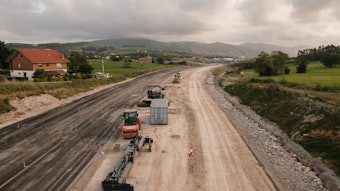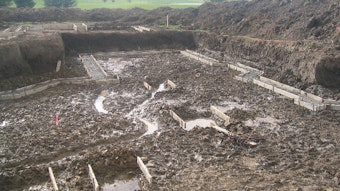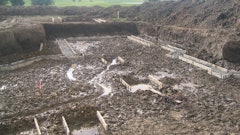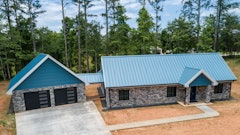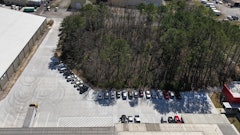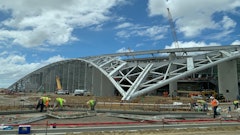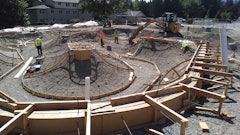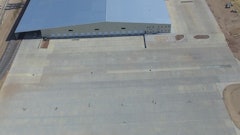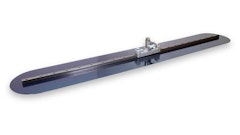

Serving more than 2 million passengers annually, Myrtle Beach International Airport (MYR) in South Carolina recently restored Taxiway A – Phase I as the first step in a multi-phased, multi-year project.
The 30-year-old asphalt taxiway was upgraded with a concrete surface protected by a new stormwater management system designed to handle the severe weather that is common in the area.
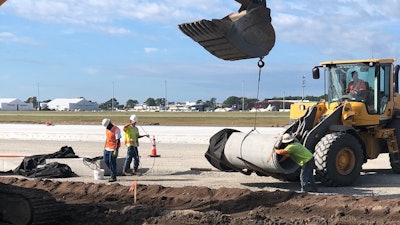 Contractors worked through a hurricane and encountered fiber optics and substandard soil to install a stormwater management system using structural concrete components from Rinker Materials.Rinker Materials
Contractors worked through a hurricane and encountered fiber optics and substandard soil to install a stormwater management system using structural concrete components from Rinker Materials.Rinker Materials
During construction of the taxiway, contractor PSI of Conway worked through a hurricane and encountered fiber optics and substandard soil to install a stormwater management system using structural concrete components from Rinker Materials.
As the primary route for airplanes transporting passengers between the MYR terminal and its lone runway, rehabilitating Taxiway A according to Federal Aviation Administration (FFA) specifications was the project's top priority.
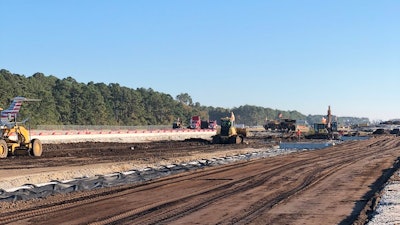 Project design included a custom stormwater management system installed over an existing fiber optic infrastructure buried less than 10 feet underground.Rinker Materials
Project design included a custom stormwater management system installed over an existing fiber optic infrastructure buried less than 10 feet underground.Rinker Materials
Delta Airport Consultants was enlisted by MYR owner, Horry County Department of Airports, to lead the project design, which included a custom stormwater management system installed over an existing fiber optic infrastructure buried less than 10 feet underground.
In addition to navigating the fiber optics, PSI of Conway also replaced unsuitable soil with compacted #57 stone to stabilize the stormwater management system, which was constructed with 6,500 feet of FFA-approved Class 5 C443 reinforced concrete pipe (RCP).
“As a coastal city susceptible to storms, we get around 50 inches of rain each year. That’s more than 10 inches above the national average, so the new airport drainage system will be tested by heavy rains regularly,” says Keith Mesimer, owner PSI of Conway. “Rather than installing a traditional single culvert of large diameter RCP, we installed multiple culverts of smaller RCP side-by-side to avoid the fiber optics, while still meeting stormwater specifications. Taking this unique approach required a variety of RCP sizes, so it was invaluable to have Rinker Materials specially-produce gasketed Class 5 RCP locally to help keep the project on schedule, even with the disruption of Hurricane Dorian.”
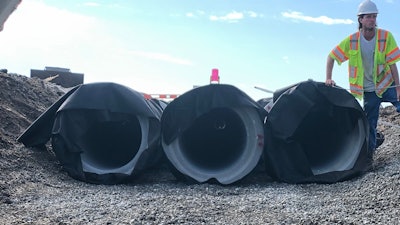 The stormwater management system was constructed with 6,500 feet of FFA-approved Class 5 C443 reinforced concrete pipe (RCP).Rinker Materials
The stormwater management system was constructed with 6,500 feet of FFA-approved Class 5 C443 reinforced concrete pipe (RCP).Rinker Materials
With no culvert deeper than 5 ft, the Taxiway A stormwater management system includes triple culverts of 36 in RCP, triple culverts of 30 in RCP, quintuple culverts of 24 in RCP and more than 36,400 lf of underdrain installed across 12 work areas. Primarily funded by an FFA grant, the $30 million Taxiway A – Phase I was completed despite 70 mph winds and more than 10 in of rain from Hurricane Dorian.
“PSI was tasked to install the stormwater system per FAA requirements and on strict schedule,” says Breck Dunne, director of airport development for Horry County. “Their knowledge and workmanship proved to be an asset to the construction team. Ultimately, PSI installed the RCP and underdrain in accordance with the project’s overall schedule and the strict airport work requirements.”

